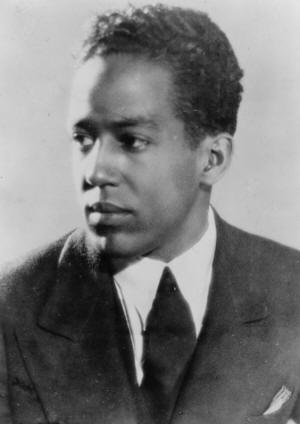|

Honored by Lincoln District 27
with Most Distinguished Graduate Award
Langston Hughes
Class of 1916
Poet, playwright, novelist
 Send a link to a friend
Send a link to a friend
[April 23, 2012]
Langston
Hughes is one of six people chosen for the Most Distinguished
Graduate Award from Lincoln Elementary School District 27. Before
the recognition program on Saturday, Lincoln Daily News received
introductory documents prepared for the occasion. Below is a copy of
the biographical material on Hughes:
|
|
 (Copy) (Copy)
Tonight, we are
honoring six of the Lincoln Elementary School District's most
significant graduates. We will begin with one of whom you have all
heard of, James Mercer Langston Hughes, black American poet, social
activist, novelist, and playwright. He was one of the earliest
innovators of the literary art form "jazz poetry", and he is best
known for his work during the Harlem Renaissance.
Langston Hughes was
born February 1, 1902 in Joplin, Missouri, the son of a school
teacher Carrie Mercer Langston and James Nathaniel Hughes, a
stenographer for a mining company. Several years later his father
and mother divorced. For a while he lived with his grandmother, Mary
Langston, in Lawrence Kansas while his mother found work.

In 1915 his mother
married Homer Clark and moved to Lincoln, Illinois. It is here that
Langston started the 8th grade in the then new Central School. While
in school in Lincoln he was elected class poet. Hughes stated that
in retrospect he thought it was because of the stereotype that
African Americans have rhythm. He said, "I was a victim of a
stereotype. There were only two of us Negro kids in the whole class
and our English teacher was always stressing the importance of
rhythm in poetry. Well, everyone knows, except us, that all Negroes
have rhythm, so they elected me as class poet."
Langston graduated
from 8th grade in Lincoln in 1916 and one of his poems was part of
the graduation ceremony. The family moved to Cleveland, Ohio where
his step father found work in a steel mill. Langston entered high
school at Central High School in Cleveland, and while in high school
he began to publish verse and short stories in the "Central High
Monthly Magazine." His writing was influenced by Walt Whitman and
Carl Sandburg. In 1920, his senior year, he was again elected class
poet and editor of the high school annual.
[to top of second column] |
 With the financial
help of his father he entered Columbia University in 1921 but left
in 1922 because of racial prejudice. The next few years found him
working odd jobs, and he served as a crewman aboard the SS Malone
which provided him an opportunity to travel in Europe. In 1926 he
met Vachel Lindsay who was impressed with his writing. By this time,
Hughes's earlier work had been published in magazines and was soon
collected into his first book of poetry, The Weary Blues.
Langston enrolled
in Lincoln University, a historically black university in Chester
County, Pennsylvania earning his BA degree in 1929. After graduating
he made his home in New York's Harlem district.
Through his writing
he stressed the theme of "black is beautiful" as he explored the
black human condition. His poetry and fiction portrayed the lives of
the working class blacks in America, lives he portrayed as full of
struggle, joy, laughter, and music.
Hughes' first
novel, Not Without Laughter was published in 1930, and won the
Harmon Gold Medal for Literature.
In 1935 he received
a Guggenheim Fellowship.
Lincoln University
and Howard University each awarded Hughes honorary Doctorates.
In 1947 he taught
at Atlanta University.

At age 65, on May
22, 1967, Langston Hughes died from complications after abdominal
surgery.
Tonight we honor
our distinguished graduate, James Mercer Langston Hughes, by placing
his plaque on the Wall of Distinguished Graduates at Lincoln Junior
High School.
[Text copied from file received] |